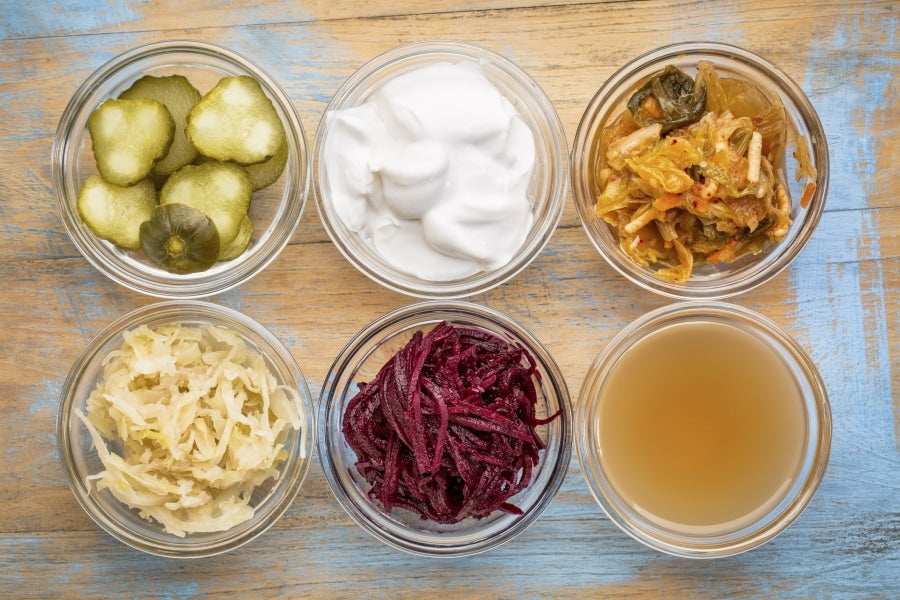
Making Your Gut Bugs Happy —It’s Not Just About Food!
Are you loading up on probiotics like sauerkraut and coconut kefir—and on prebiotics like jicama, onions, and asparagus? If so, hurray for you! The first step in creating a healthy gut ecosystem is to feed it all the right foods (along with prebiotic and probiotic supplements), and I’ve already written about that.
But you know me… I’m always nagging you to get even more healthy. So now, I want you to take extra steps that will help you build a beautiful gut. You see, eating right is only part of the story when it comes to your gut. Here are three other powerful actions you can take to keep it at its best.
Relax!
Yeah, I know—I know. Who can relax in this day and age? There’s always something more to do, whether it’s working overtime or tackling that overflowing laundry basket. But here’s the thing: If you want a healthy gut, getting a little R&R isn’t just an option. It’s a necessity. Chronic stress is absolutely devastating to your gut bugs. It lowers their diversity. It causes inflammation, which makes them sick. It causes you to eat (and drink) stuff that isn’t good for you, making them even sicker.
It puts you at higher risk for infections that can lead to antibiotics—which are like dropping a nuclear bomb on them. So you need to battle that stress. In previous posts, I’ve shared some great ways to do this—from strategizing your yesses to practicing meditation. And right now, I’d like to share some even simpler ones. These take just a few minutes, so you can fit one or two of them into your life even on crazy days:
- Dance. If you only have ten minutes of free time, make the most of it! Put on your favorite music and boogie to it. It’s an instant stress reliever.
- Laugh. Watch a comedy show clip, or queue up some silly YouTube videos. It’s fun and relaxing, and scientific research shows that laughing can actually improve the microbiome of people with autoimmune issues. No joking!
- Share. Tell a friend that you’re stressed. Simply admitting it can help you get control over it.
- Cry. Sometimes, you just need to let it out. So run the water in the tub and turn on the bathroom fan so nobody can hear you, and then indulge in a few weepy moments. Fix your makeup afterward, and nobody will know except you.
- Say a quiet “thank you.” Gratitude is a great stress-buster. So once a day, when you have a few minutes of free time, think of ten things—large or small—for which you’re grateful.
Exercise.
Exercise helps you rein in your stress, fights chronic inflammation, and keeps your metabolism humming. So it’s no surprise that it also makes your gut bugs happy! Want hard evidence? In one study, researchers analyzed the gut bugs of 40 professional athletes participating in a pre-season rugby camp, comparing them to healthy controls. The athletes had a much higher diversity of gut bugs, a key indicator of gut health.
In a newer study that controlled for the effects of participants’ diets, scientists found that cardiorespiratory fitness correlates strongly with higher gut microbe diversity. And again—I know that life is hectic, but even on days when you’re too busy for a full workout, you can work in some mini-exercise. Even little changes like these will make a difference:
- Climb stairs instead of taking elevators.
- Park your car at the far end of the parking lot, rather than looking for the closest spot.
- Do squats while you’re waiting for your nail polish to dry, do ab contractions while you’re showering, and do calf raises while you’re drying your hair.
- Do sneaky exercises like these at your desk.
These little tricks add up, and they’ll give you a good dose of exercise even on your no-workout days.
Get your ZZZZs.
You know how cranky you get when your sleep is disrupted? Well, your gut bugs get cranky, too! That’s because they have their own circadian rhythms, and altering your sleep pattern messes with these rhythms. In fact, if you work a swing shift or travel a lot, it can put you at higher risk for metabolic problems. What’s more, even sleeping regular hours isn’t good enough if you don’t sleep enough hours. Prolonged sleep deprivation causes low-grade chronic inflammation, which is murder on your gut bugs.
So how can you improve your odds of getting a good night’s sleep? Here are some tips that can help:
- Establish firm rules for bedtimes—for both kids and adults—and stick to them.
- Turn off the TV and all devices at least two hours before bedtime.
- Keep your bedroom as dark as possible. Blackout curtains are a great investment.
- Keep your bedroom temperature comfortable, and turn on a fan to improve the circulation.
- Create your own bedtime routine; for instance, take a warm bath, read a book, or play restful music. (Lullabies work for grownups, too!)
- Wear blue-blocking glasses for a few hours before bedtime (blue light suppresses melatonin).
- Avoid drinking alcohol or caffeinated beverages within two hours of bedtime—and go easy on any liquids, so you won’t need to make a middle-of-the-night bathroom run.
- Delegate more chores, so you aren’t running from sunup to sundown.
— I know that all three of these simple steps—de-stressing, exercising, and getting more sleep—aren’t really all that simple when life gets crazy. And I confess that sometimes, I break these rules myself. (Don’t even ask me about last week.) So don’t kick yourself if you occasionally skip an exercise session, burn the candle at both ends, or let stress get the better of you. But do your best to take good care of yourself… because your gut bugs will thank you for it!
Keep thinking Big and living BOLD!








